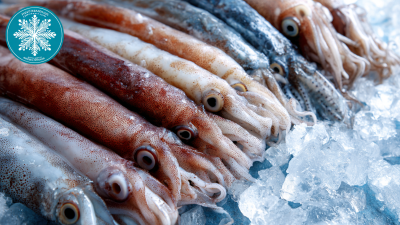 Cooking Frozen Squid has become a popular trend among home cooks and professional chefs alike, primarily due to its remarkable versatility and nutritional benefits. According to a report from the National Fisheries Institute, squid is rich in essential nutrients like protein, omega-3 fatty acids, and vitamins, making it a heart-healthy choice for a balanced diet.
Cooking Frozen Squid has become a popular trend among home cooks and professional chefs alike, primarily due to its remarkable versatility and nutritional benefits. According to a report from the National Fisheries Institute, squid is rich in essential nutrients like protein, omega-3 fatty acids, and vitamins, making it a heart-healthy choice for a balanced diet.
Furthermore, the global frozen seafood market is projected to reach $24 billion by 2025, indicating a growing demand for convenience without compromising quality.
Experts recommend proper preparation techniques to enhance flavor and texture while ensuring maximum safety. Understanding the unique characteristics of frozen squid, including its lower calorie content and high mineral levels, can help transform everyday meals into gourmet experiences.
As we delve deeper into the secrets of Cooking Frozen Squid, you’ll discover valuable tips and health insights that will elevate your culinary skills and embrace delicious possibilities.
 Frozen squid is not only a convenient ingredient but also a powerhouse of nutrition. Rich in protein, omega-3 fatty acids, and essential vitamins and minerals, it offers numerous health benefits that are supported by research. Studies indicate that consuming squid can promote heart health, support brain function, and aid in muscle recovery due to its high levels of protein and antioxidants.
Frozen squid is not only a convenient ingredient but also a powerhouse of nutrition. Rich in protein, omega-3 fatty acids, and essential vitamins and minerals, it offers numerous health benefits that are supported by research. Studies indicate that consuming squid can promote heart health, support brain function, and aid in muscle recovery due to its high levels of protein and antioxidants.
When preparing frozen squid, it’s crucial to thaw it properly to maintain its texture and flavor. Tips for optimal cooking include soaking the squid in cold water for about 30 minutes or using the microwave on a defrost setting. Once thawed, marinating squid in acidic ingredients like lemon juice or vinegar can enhance its taste while also tenderizing the meat. Grilling or quick frying is recommended to achieve a tender yet firm texture, ensuring that the nutrients remain intact.
Incorporating frozen squid into your diet can be delicious and nutritious. Adding it to stir-fries or salads not only elevates the meal's flavor but also boosts its nutritional profile. With its versatility and health benefits, frozen squid is a worthy addition to any meal plan.
When it comes to cooking frozen squid, the key lies in mastering effective preparation techniques that enhance both flavor and texture. One of the top methods is the quick thawing technique. Submerging the squid in cold water for about 30 minutes ensures even thawing without compromising its natural taste. Once thawed, it's important to pat the squid dry to achieve a perfect sear during cooking.
Another excellent preparation technique is marinating. Using a mixture of olive oil, garlic, lemon juice, and herbs can infuse the squid with delicious flavors. Allowing it to marinate for at least 30 minutes before grilling or sautéing makes all the difference. For a crispy texture, consider coating the squid in seasoned flour or breadcrumbs before frying. This adds an irresistible crunch that pairs perfectly with the tender meat. Lastly, keep cooking times brief; whether stir-frying or grilling, squid cooks quickly, typically within just a few minutes, preventing it from becoming rubbery. These techniques ensure that your frozen squid dishes are not only healthful but also bursting with flavor.
| Preparation Technique | Description | Health Benefits | Cooking Time | Flavor Profile |
|---|---|---|---|---|
| Boiling | Cook squid in boiling water for a tender texture. | Low in calories, rich in protein. | 3-5 minutes | Mild and slightly sweet |
| Grilling | Direct heat for charred flavor; ideal for skewers. | Contains omega-3 fatty acids, heart-healthy. | 5-10 minutes | Smoky and savory |
| Stir-Frying | Quick cooking with vegetables and sauces. | High in antioxidants and vitamins from vegetables. | 6-8 minutes | Bold and colorful |
| Baking | Baking squid with spices for enhanced flavor. | Low fat; can add vegetables for fiber. | 15-20 minutes | Herbaceous and aromatic |
| Ceviche | Marinate squid in citrus juices for a refreshing dish. | High in protein and low in carbs. | 30 minutes (marinating time) | Zesty and tangy |
 Frozen storage significantly affects squid's nutritional profile and texture quality, making it essential for consumers to understand the implications of this preservation method. According to a study published in the Journal of Food Science, freezing squid at ultra-low temperatures preserves key nutrients, such as protein and omega-3 fatty acids, with minimal loss. The report indicates that frozen squid can retain up to 90% of its original nutritional value, making it a health-conscious choice for seafood lovers.
Frozen storage significantly affects squid's nutritional profile and texture quality, making it essential for consumers to understand the implications of this preservation method. According to a study published in the Journal of Food Science, freezing squid at ultra-low temperatures preserves key nutrients, such as protein and omega-3 fatty acids, with minimal loss. The report indicates that frozen squid can retain up to 90% of its original nutritional value, making it a health-conscious choice for seafood lovers.
However, the texture of frozen squid can be impacted by the freezing process. The Marine Resources Research Foundation notes that improper freezing techniques can lead to ice crystal formation, which may compromise the tenderness of the meat. To mitigate this, flash freezing is recommended, allowing the squid to maintain its desirable texture. Overall, understanding the effects of frozen storage can help consumers appreciate the health benefits of squid while ensuring they enjoy its optimal quality in culinary applications.
Cooking frozen squid can be a delightful culinary experience that not only maximizes flavor but also enhances nutritional benefits. Experts suggest that the best methods to prepare squid include steaming, grilling, or stir-frying, as these techniques help retain the delicate texture and unique taste of the seafood. Steaming is particularly effective, as it provides a low-calorie cooking option while preserving the nutrients, including high protein content, omega-3 fatty acids, and essential vitamins. According to a study conducted by seafood nutritionists, cooking methods that involve lower temperatures can minimize nutrient loss, allowing you to fully benefit from the squid's rich profile without sacrificing flavor.
Moreover, combining frozen squid with vibrant vegetables can further enhance both its taste and nutritional value. Nutritionists recommend adding colorful ingredients, which not only boost the aesthetic appeal of your dish but also improve vitamin intake. For instance, pairing squid with bell peppers or leafy greens can enrich your meal with antioxidants and enhance metabolic function, a claim supported by recent research on food synergies. Additionally, incorporating various herbs and spices can further amplify the flavor while providing health benefits, making frozen squid a versatile choice in health-conscious cooking.
This chart compares various cooking methods for frozen squid based on flavor score and nutritional retention. Grilling and frying score the highest in flavor, while boiling and steaming retain the most nutrients.
When discussing the health benefits and sustainability of squid, a comparative analysis between
frozen and fresh squid reveals significant insights. According to a report by the
Food and Agriculture Organization (FAO), frozen squid can have comparable nutritional value to its fresh counterparts.
Fresh squid typically has a higher water content, which can lead to quicker spoilage and nutrient degradation. In contrast, flash-freezing methods
preserve the delicate nutrients, including omega-3 fatty acids, protein, and various B vitamins, leading to frozen squid being
a viable alternative in terms of health benefits.
From an environmental standpoint, frozen squid can often be
more sustainable. A study published by the
Marine Stewardship Council (MSC) highlights that frozen squid sourced from well-managed fisheries helps reduce
carbon emissions linked to transportation. This is particularly relevant for regions where fresh squid has to travel great distances to reach consumers.
Additionally, using frozen squid can minimize waste, as it can be stored for longer periods without the risk of spoilage, aligning with sustainability
goals by promoting less food waste. Thus, for health-conscious and environmentally-aware consumers,
frozen squid presents a compelling choice over its fresh alternative.






